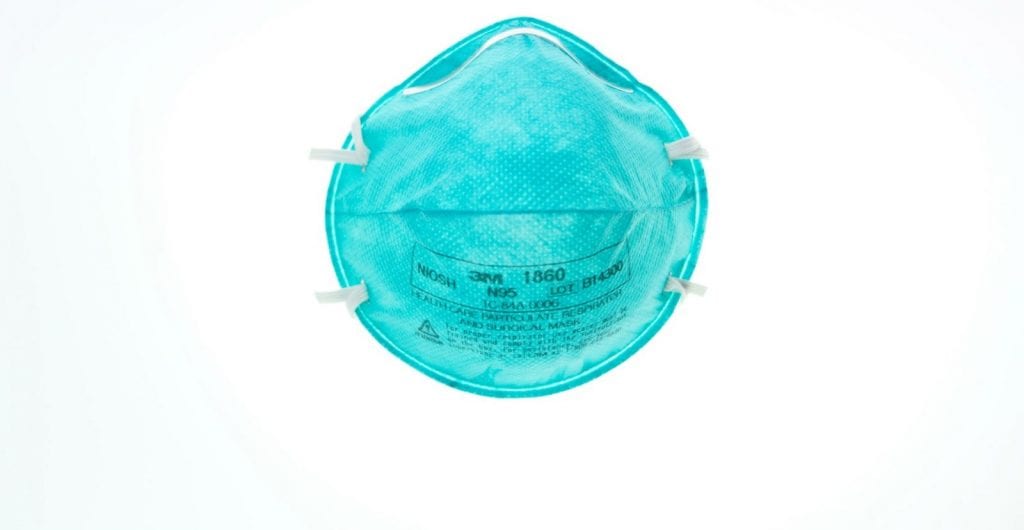3M has filed a second trademark lawsuit over the alleged marketing and sale of infringing masks. In a complaint that very-closely mirrors the trademark, unfair competition, and false designation of origin claims in the one that it filed against Performance Supply last week, the industrial and safety supply conglomerate accuses Rx2Live, LLC of “seeking to exploit the current public health emergency and prey on innocent parties through a variety of scams involving 3M N95 respirators and other products in high demand.”
In its complaint, which was filed in the U.S. District court for the Central District of California, 3M alleges that Rx2Live contacted Fresno-based healthcare provider Community Medical Centers on March 27 “to advertise PPE products available through Rx2Live, including purported 3M-brand N95 respirators.” Over the next several days,” 3M claims that an employee for Rx2Live “perpetuated the fraud by providing Community Medical Centers with additional promotional materials, including a pricing list and a PowerPoint presentation … that advertised the availability of ‘3M N95 1860’ surgical respirators and ‘3M N95 8210’ standard respirators, ‘Direct from 3M.’”
St. Paul, Minnesota-headquartered 3M asserts that “the PowerPoint presentation stated that a minimum order of 10 million masks was required (at grossly inflated purchase prices of $52 million for surgical masks and $49.5 million for standard masks in contrast to 3M’s list prices of $12.7 million and $10.2- $13.1 million, respectively).”
Just as in the case that it recently lodged against Performance Supply, 3M claims that Rx2Live “is not, and never has been, an authorized distributor of any of 3M’s products and has no rights to use 3M’s famous marks.” As such, “By using 3M’s famous marks in [its] promotional materials and product listings, and holding itself out to be an authorized distributor of 3M products, [it has] confused and deceived consumers,” i.e., has engaged in trademark infringement.
More than that, though, 3M is particularly bothered by the fact that Rx2Live is offering the masks for sale “at unconscionably high prices that were approximately 4-5 times above 3M’s list prices,” which constitutes “extreme price-gouging by any measure, including under California state law.” The company states in both cases that even as “the demand for 3M-branded respirators has grown exponentially in response to the pandemic,” it has been “committed to seeking to meet this demand while keeping its respirators priced fairly.”
3M – which explicitly asserts in both lawsuits that it “has not increased the prices that it charges for 3M respirators as a result of the COVID-19 outbreak” – clearly wants to avoid landing on the wrong side of the court of public opinion in light of the global health pandemic in the same way that Uber, for example, came under fire for surge pricing in the midst of tragedies, including the London terror attack in June 2017 and before that, in the New York during Hurricane Sandy in 2012, with both instances (and others) generating widespread complaints among consumers.
In terms of the legal implications of Rx2Live’s attempts to sell 3M masks at jacked up prices and without having any connection with 3M (other than being in possession of its products), it is may not necessarily be as straightforward as 3M makes it out to be in its complaints. After all, while 3M refers to “purported 3M-brand” masks in the case at hand, it – quite tellingly – does not actually accuse the defendants in either case of selling counterfeit or otherwise infringing masks, and instead, focuses on their unauthorized use of its 3M trademark in the marketing of those masks, which the company characterizes as the defendants’ attempts to appear to be connected with 3M when they are not. 3M’s lack of counterfeiting or infringement claims in connection with the masks, themselves, suggests that the masks are authentic 3M products, and the issue is with the defendants’ “unauthorized” marketing and sale of the products.
As we previously noted, Mark McKenna, the acting Director of Notre Dame Technology Ethics Center and Director of Notre Dame Law School’s Program on Intellectual Property & Technology Law, reflecting on 3M’s claims in the Performance Supply case, stated that trademark rights holders generally “do not get to control the re-sale of genuine goods,” as established by the First Sale Doctrine, the trademark (and copyright) tenet that cuts off a trademark holder’s right to police to use of its mark on a product that it has released into the mark (meaning its right to control the distribution of the good via trademark claims is exhausted). In other words, assuming that the defendants in these cases are selling authentic masks that they legally acquired, and that have not been “materially” altered, they are likely shielded from infringement liability thanks to a First Sale defense.
The defendants may also be shielded from liability in terms of their use of 3M’s trademark in connection with the marketing and sale of the masks on a nominative fair use basis, which allows for the otherwise unauthorized use of another’s trademark to refer to the trademark owner’s actual goods and services associated with the mark. The issue will be whether the defendants are, in fact, holding themselves as as though they are affiliated with or otherwise connected to 3M, as that would be an area where 3M actually has grounds for trademark-related action. After all, as McKenna asserts, trademark holders “do get to prevent others from falsely representing themselves as authorized re-sellers.”
As for the fact that the defendants are significantly inflating the prices of the masks, that “is 3M’s motivation [for filing such suits],” per McKenna, but the act of price-gouging, itself, “it is not relevant to its trademark claims.”
In connection with the suit, which is 3M’s second COVID-19-specific filing, the company is seeking injunctive relief to bar Rx2Live from infringing its “3M” trademarks any further and an array of monetary damages, which 3M says “will be donated … to a COVID-19 charitable organization(s)/cause(s) of [its] choosing.”
*The case is 3M Company v. Rx2Live, LLC, 1:20-cv-00263 (E.D.Cal).













